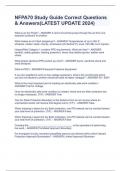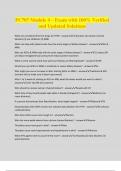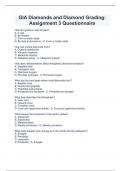Education and Ethics
Module Code: ED4-ETH1
Assignment 1
_________________________________________
In partial fulfilment of the requirements in Post Graduate Certificate
in Education (Foundation Phase) (PGCE FP) at Cornerstone
Institute.
_________________________________________
By L.M. Jaffe
SN: 38483
_________________________________________
16 August 2019
, Ethics in education aims to affect development and integrity. Ethics in education aims
to encourage learners to build knowledgeable skills in order to differentiate between
what is good or bad and what is moral or immoral behavior (Christie, 2005). Ethics in
Education includes the process of persistent questioning and modifying your
thoughts to be relative to concepts of human decency and how we morally act
towards others (Christie, 2005). This essay presents an ethical dilemma and critically
discusses how an early childhood educator might best respond to it (Feeney &
Freeman, 2016).
Dan has just turned five years old and he is relatively new to school. Dan has
difficulty communicating with others as his speech is underdeveloped. Mandy, Dan’s
new teacher, has observed Dan struggling socially. He often spends his time with
Mandy rather than with his peers. When he tries to communicate with them, he uses
an aggressive tone and tells the teacher that other learners are doing something he
deems “wrong”. He prefers to watch others and comment on their actions. Initially
Mandy thought Dan may just be adjusting to the new school environment.
The school provides snack for all learners where they encourage them to eat a
variety of fruit as well as bread or rice cakes with a selection of spreads. The
selection is to encourage children to make choices and to eat a nutritional, varied
snack each day. Mandy has observed that Dan only drinks milk and eats processed
cheese spread that he brings from home and he refuses to eat any of the snack
provided by the school. When Dan is finished drinking his milk, he often complains
that he has a sore tummy and struggles to concentrate during activity time. One day
Mandy asked him why he does not want to have some bread with butter on it or to try
something else? He responded in an aggressive tone saying, “Mom said I cannot eat
anything else”. Mandy was a bit taken back and decided to speak to Dan’s mom
about his stomach aches and asks her why Dan has such specific dietary
requirements.
An ethical dilemma is present as there is conflict between the family’s wishes and the
teacher’s responsibility to adhere to good ethical child practice. Shapira-Lishchinsky
(2011) states that there are many dimensions to diverse ethical dilemmas. The main
dimensions that are present in this case is the dilemma between the family’s agenda
and the schools’ practice. As educators, we have the responsibility to make sure that
our learners are supported emotionally, socially and nutritiously (Shapira-
Lishchinsky, 2011).
It turns out that Dan’s mom has not yet introduced him to any solid foods. Mandy felt
that her reasons for this were not clearly justified and she simply responded with “he
is not ready to eat solid food yet and please do not allow him to eat anything other
than what is in his lunch box”. Dan was exceptionally small compared to his peers
and his teeth were extremely brown. Mandy knew that no religious or family belief
could justify Dan’s health and nutritional status. Mandy should ask for wider support
from her colleagues and request further help from the principal of the school to
resolve this ethical dilemma (Shapira- Lishchinsky, 2011). Mandy should not let
Dan’s mother manipulate her way out of this situation because as educators we have
specialized sovereignty towards the health and wellbeing of our learners.
Module Code: ED4-ETH1
Assignment 1
_________________________________________
In partial fulfilment of the requirements in Post Graduate Certificate
in Education (Foundation Phase) (PGCE FP) at Cornerstone
Institute.
_________________________________________
By L.M. Jaffe
SN: 38483
_________________________________________
16 August 2019
, Ethics in education aims to affect development and integrity. Ethics in education aims
to encourage learners to build knowledgeable skills in order to differentiate between
what is good or bad and what is moral or immoral behavior (Christie, 2005). Ethics in
Education includes the process of persistent questioning and modifying your
thoughts to be relative to concepts of human decency and how we morally act
towards others (Christie, 2005). This essay presents an ethical dilemma and critically
discusses how an early childhood educator might best respond to it (Feeney &
Freeman, 2016).
Dan has just turned five years old and he is relatively new to school. Dan has
difficulty communicating with others as his speech is underdeveloped. Mandy, Dan’s
new teacher, has observed Dan struggling socially. He often spends his time with
Mandy rather than with his peers. When he tries to communicate with them, he uses
an aggressive tone and tells the teacher that other learners are doing something he
deems “wrong”. He prefers to watch others and comment on their actions. Initially
Mandy thought Dan may just be adjusting to the new school environment.
The school provides snack for all learners where they encourage them to eat a
variety of fruit as well as bread or rice cakes with a selection of spreads. The
selection is to encourage children to make choices and to eat a nutritional, varied
snack each day. Mandy has observed that Dan only drinks milk and eats processed
cheese spread that he brings from home and he refuses to eat any of the snack
provided by the school. When Dan is finished drinking his milk, he often complains
that he has a sore tummy and struggles to concentrate during activity time. One day
Mandy asked him why he does not want to have some bread with butter on it or to try
something else? He responded in an aggressive tone saying, “Mom said I cannot eat
anything else”. Mandy was a bit taken back and decided to speak to Dan’s mom
about his stomach aches and asks her why Dan has such specific dietary
requirements.
An ethical dilemma is present as there is conflict between the family’s wishes and the
teacher’s responsibility to adhere to good ethical child practice. Shapira-Lishchinsky
(2011) states that there are many dimensions to diverse ethical dilemmas. The main
dimensions that are present in this case is the dilemma between the family’s agenda
and the schools’ practice. As educators, we have the responsibility to make sure that
our learners are supported emotionally, socially and nutritiously (Shapira-
Lishchinsky, 2011).
It turns out that Dan’s mom has not yet introduced him to any solid foods. Mandy felt
that her reasons for this were not clearly justified and she simply responded with “he
is not ready to eat solid food yet and please do not allow him to eat anything other
than what is in his lunch box”. Dan was exceptionally small compared to his peers
and his teeth were extremely brown. Mandy knew that no religious or family belief
could justify Dan’s health and nutritional status. Mandy should ask for wider support
from her colleagues and request further help from the principal of the school to
resolve this ethical dilemma (Shapira- Lishchinsky, 2011). Mandy should not let
Dan’s mother manipulate her way out of this situation because as educators we have
specialized sovereignty towards the health and wellbeing of our learners.




